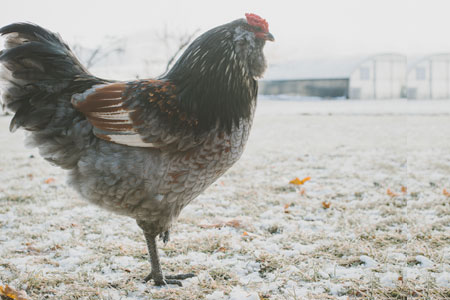
Cold winter weather brings a different set of issues for a flock of chickens, compared to warmer summer weather. So what kind of care do chickens need in winter?
Control Humidity
The most important thing you can do during cold weather is to make sure the coop isn’t high in humidity. Relative humidity is generally low during cold weather, but the air inside a chicken coop can be high in humidity from the flock breathing and pooping.
When the air is damp, a chicken’s body needs to generate more heat energy to stay warm. A temperature that’s low enough to freeze moisture in the air can freeze combs, wattles, and toes. So a damp coop is conducive to frostbite.
To minimize coop humidity, make sure the litter is clean, fresh, and fluffy. While you’re at it, add a little extra litter as insulation. Stirring overnight poop into deep litter, or removing beneath-roost poop each morning, will help reduce humidity.
Encouraging the flock to spend days outdoors is another big help. Most chickens would rather be outdoors during the day, regardless of cold weather. But they need a resting place out of direct wind, preferably in a sunny spot where they can warm themselves.
Avoid Draftiness
Chickens stay warm in winter by ruffling up their feathers to trap warm air. A draft carries away that warm air, causing the birds to chill.
On the other hand, good ventilation helps prevent humidity from accumulating inside the coop. So you don’t want the coop to be so tight as to prevent healthful air circulation.
If moisture accumulates inside your coop windows, the coop isn’t well enough ventilated. If you hang a strip of tissue paper in the roosting area and it flutters, the coop is too drafty. Either condition needs to be remedied before the weather turns cold.
Feed & Water
Cold weather means chickens need more dietary energy to stay warm. Boosting carbohydrates in your flock’s ration will help them generate body heat.
You can balance their diet in favor of carbohydrates by switching to a lower protein ration. Another way is to offer a little scratch grain just before the flock goes to roost. Digesting grain during the night helps chickens stay warm.
Fresh clean drinking water is just as important in winter as in summer. When the temperature is low enough to freeze the drinking water, you may need to dump out and refill drinkers several times a day. Encourage your chickens to remain hydrated by providing warm water with each refill.
If your coop is wired for electricity, a simpler solution is to use a water base heater. To save on electricity, plug the base heater into a preset thermostat, which will turn the heater on at 35ºF and off at 45ºF.
Collect Eggs Often
Freezing weather can cause eggs to crack. So “don’t make the mistake of leaving them in the coop,” advises Jeff Smith of Cackle Hatchery®.
Collect eggs often to ensure they don’t freeze, which would render them unusable for culinary purposes. Not only that, says Jeff, but “leaving cracked eggs in the nest can teach your chickens to eat eggs.”
Secure Facility
In winter time, when other food sources are scarce, predators are likely to be attracted to your tasty chickens. Double check the fence around your chicken run to make sure predators can’t get in. Also that your chickens can’t get out and into harm’s way.
Check your coop, as well, for predator resistance. Make sure window and vent openings are secure. And check to make sure your door hinges and latches remain tight.
Finally, be sure to close up your flock indoors overnight. An automatic door closer is a big help when winter nightfall comes early and you might be busy elsewhere.
Chickens are basically warm-weather birds. For a flock to thrive in a cold climate, we humans need to carefully think about what kind of care chickens need in winter.
And that’s today’s news from the Cackle Coop.
Gail Damerow is the author of Storey’s Guide to Raising Chickens. Photo by Carter Yocham on Unsplash.

